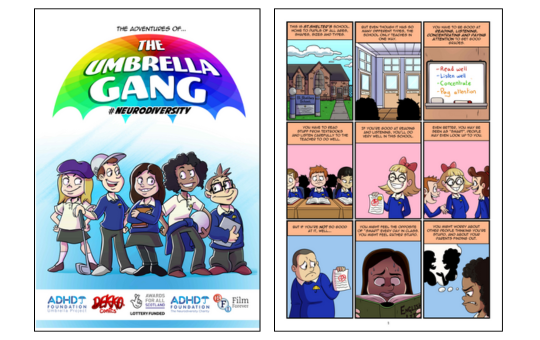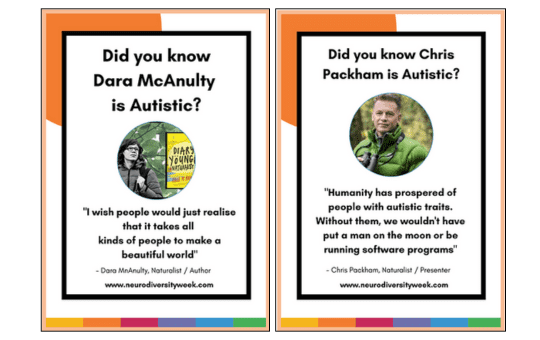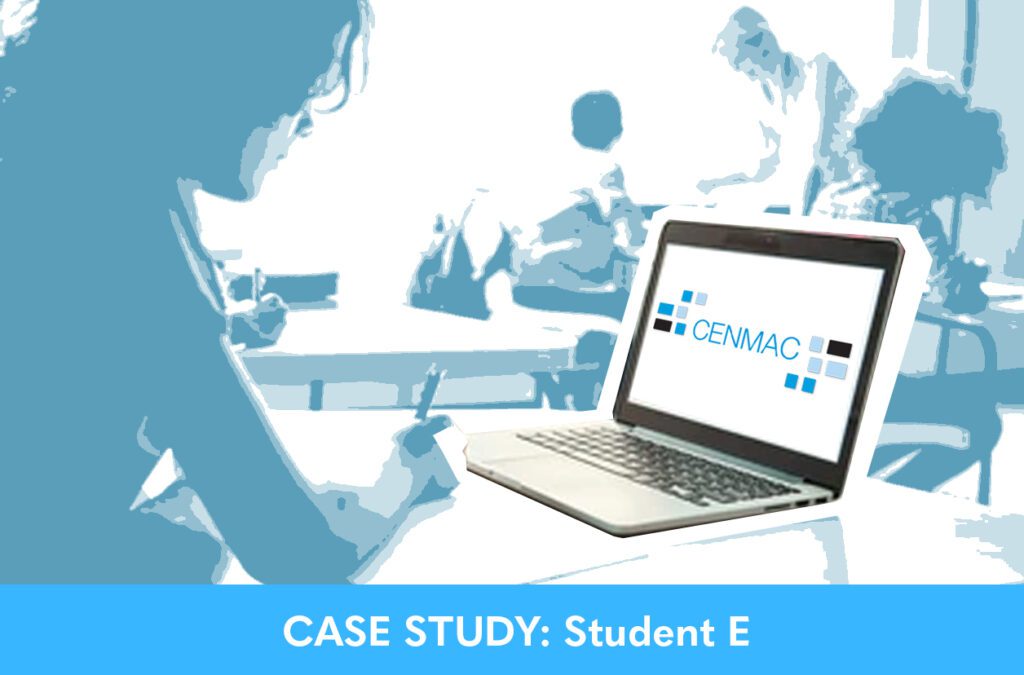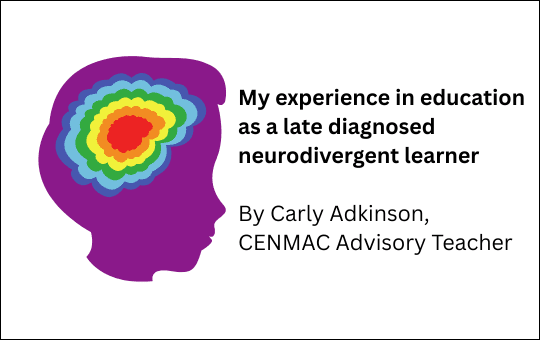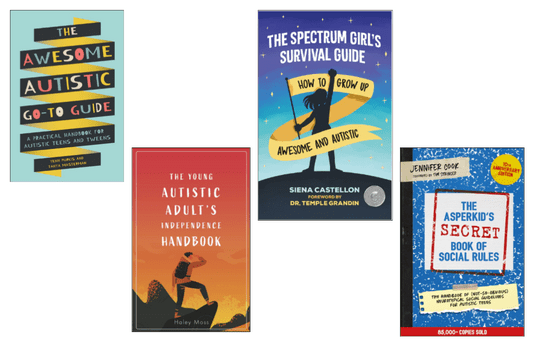Celebrating Neurodiversity
World Autism Acceptance Month
April is World Autism Acceptance Month and is an opportunity for everyone to come together and raise awareness, foster acceptance, and create a society where autistic people are supported, understood, and empowered.
Autism influences how people experience and interact with the world and is is a lifelong neurodivergence.
Resources to help celebrate neurodiversity
The National Autistic Society also has some useful information and interesting statistics about autism. For example, did you know that more than 1 in 100 people are autistic and there are at least 700,000 autistic adults and children in the UK?
There are lots of useful resources available to help schools celebrate neurodiversity and we have compiled some interesting case studies, blogs and resources below.
What is Neurodiversity?
Neurodiversity refers to the different ways a person’s brain processes information.
The following are types of neurodiversity:
Autism, or Autism Spectrum Conditions
ADHD: Attention Deficit Hyperactivity Disorder, or ADD: Attention Deficit Disorder
Dyscalculia
Dyslexia
Dyspraxia, or Developmental Coordination Disorder (DCD)
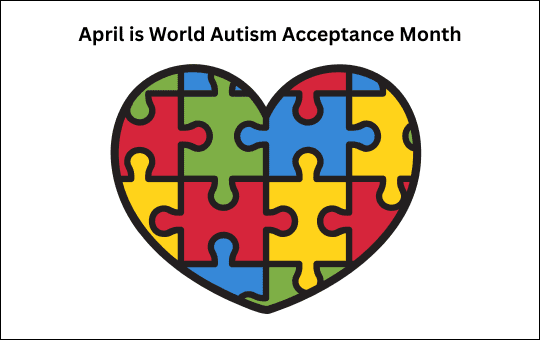
April is World Autism Acceptance Month
Download the Neurodiversity Comic Book
Downloadable posters celebrating neurodiversity
Adapting the technology to support individual strengths and motivate learning
Student E is a Year 10 student at a mainstream secondary school with a alternative resources provision. Student E has a deep interest in specialist subjects such as dinosaurs, the natural world, and biology. He is very knowledgeable, with an advanced vocabulary and understanding of technical terms related to this interests. Student E excels verbally but this is not matched by his ability to create pieces of writing which fully reflect his cognition.
Communication Works South – Reserve your free ticket!
CENMAC’s annual event Communication Works South is coming up on Thursday 22nd May at the Charlton Athletic Football Club. This free event providing a platform for our CENMAC students to “get seen” and to celebrate their achievements. It is an opportunity for the SEND community to come together and see first hand how our children and young people access the curriculum and/or communicate using assistive technology (AT) and augmentative and alternative communication (AAC).
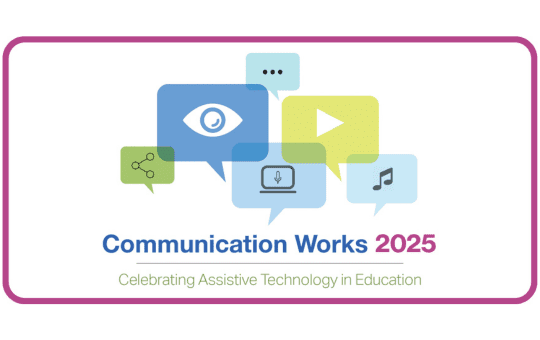
A Game-Changer: How CENMAC Transformed My Daughter’s Education
As a parent of a child with special needs, I have witnessed firsthand the challenges that come with finding the right educational support. My daughter is autistic, selectively mute, and has a functional neurological disorder that prevents her from opening her hands. For nearly five years, she has been unable to learn in a traditional school environment. However, despite these challenges, she has a strong desire to learn, and we were determined to find a way to support her education.
Now studying two GCSEs online from home, my daughter needed the right technology to help her succeed. That’s when CENMAC stepped in, and their support has been nothing short of life-changing. When they came to our home for an assessment, their team was nothing but excellent—empathetic, considerate, kind, and thoughtful. They took the time to understand her unique needs and put together a tailored package of assistive technology that has opened doors we never thought possible.
Thanks to CENMAC, my daughter now has access to a laptop equipped with specialised tools such as Dragon for speech recognition, Equatio for mathematical notation, and a special stylus pen to help her interact with the screen. She also uses a microphone and Bluetooth headphones, allowing her to engage with her studies in a way that suits her needs. This technology has enabled her not only to pursue her GCSEs but also to study for a Level 3 Diploma in Canine Care and Knowledge—something she is incredibly passionate about.
Without CENMAC’s support, she would not have been able to continue her education. Their provision of this technology has truly been a game-changer, and we are beyond grateful for their help. Thank you, CENMAC, for making learning possible!
Feedback from parent received by Advisory Teacher Wayne McCullogh-Dee.
My Experience in Education as a Late Diagnosed Neurodivergent Learner
At 40 years old, I was diagnosed with ADHD, and it was like everything in my life finally started making sense. The decision to seek a diagnosis came after watching my son struggle in ways that felt painfully familiar. His challenges with focus, organisation, and executive functions mirrored my own experiences growing up, and it made me reflect on my childhood, education, and career. Finally, I had an explanation for the struggles I had faced for so long.
Understanding, accepting and supporting individuals with ADHD
CENMAC Advisory Teacher Carly Adkinson encourages everyone to educate themselves about ADHD to increase understanding, acceptance and support for individuals with ADHD. Carly includes some useful tips about some assistive technology that can be used to help manage time effectively and independently.

Get organised with Tiimo
Tiimo is an award-winning neuroinclusive planner. Tiimo can support you in organising your studies, building routines, and managing your time—so you can stay on top of tasks and succeed with less stress. Watch this 30-minute overview of Tiimo and how it can help.
Inspiration 11 a lifetime tool for users with cognitive challenges
Inspiration 11 is used to create a variety of visual diagrams, maps, outlines, presentations and more. Combining visual and verbal cues, the software allows students to create highly customisable diagrams that help with creativity, engagement, and memory retention.
This is particularly effective for users with neuro-differences or cognitive challenges, where Inspiration 11 often becomes a lifelong tool they depend on in education, the workplace and personally.
Case Study – Daisy
CENMAC supports many neurodiverse students with assistive technology to support their communication and access to the curriculum. Take a look at a case study featuring Daisy a chatty and bright student with a diagnosis of ADHD and Autism.

Supporting Students with Scanmarker Reading Pens
In this recorded session Aventido Product Specialist James presents Scanmarker Reading and Translation pens.
He explores the practical applications and benefits of Reading and Translation Pens in an educational setting.
James shows how using multiple ways to process information can benefit pupils with dyslexia, how text and phonetic translation can aid EAL students understanding (English Additional Language).
He also demonstrates how reading pens work, how students can use Scanmarker as a translation, recording and revision device to help in every aspect of study.
How Ayoa supports SEND students
Ayoa is an innovative tool designed to support students with special educational needs and disabilities. In this recorded session we delve into this user-friendly platform, exploring how it aids SEND students in becoming more effective in their learning and how it fosters inclusivity. Whether you’re an educator, parent, or professional working with SEND individuals, equip yourself with the knowledge to maximise Ayoa’s potential.
Useful resource – Pomodoro Kitty
The Pomodoro Technique is a time management method that uses a kitchen timer to break work into intervals, typically 25 minutes in length separated by short breaks. At CENMAC we have found that this technique is a useful way for our students who have ADHD to manage their study time.
This useful website allows you to set the amount of time you would like to complete a task and then how long you would like to have a break between tasks.

Mary Long’s Book Recommendations
Here are some of CENMAC’s Mary Long’s top book recommendations to help celebrate and understand neurodiversity:
Aphantasia: Experiences, Perceptions, and Insights by Alan Kendle
Neurotribes: The Legacy of Autism and How to Think Smarter About People Who Think Differently by Steve Silberman
Speechless by Fiacre Ryan
The Autistic Brain: understanding the autistic brain by Temple Grandin and Richard Panek
Thinking in Pictures by Temple Grandin (Author)
Wonderfully Wired Brains: An Introduction to the World of Neurodiversity by Louise Gooding and Ruth Burrows
Puffin books has a nice selection of children’s books featuring neurodiversity. It’s important for children to see themselves and others in the books they read. Introducing children to different lived experiences helps them develop empathy and understanding, as well as an appreciation for others who may not be the same as they are. These books will help to explore neurodiversity and give those who may be neurodiverse a greater sense of self as they read.
Jessica Kinglsey Publishers have good selection of books to support neurodiverse young people including The Awesome Autistic Go-To-Guide, The Spectrum Girl’s Survival Guide, The Young Autistic Adult’s Independence Handbook and The Asperkids’ Secret Book of Social Rules.




